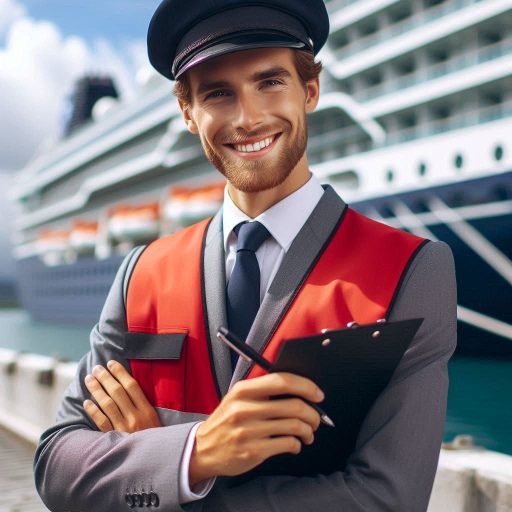Introduction
The cruise ship industry has grown significantly in recent years.
Millions of passengers embark on cruises each year.
This industry offers diverse career opportunities.
It combines hospitality, entertainment, and travel.
Employees work in various roles, from hospitality to technical services.
Each position contributes to an unforgettable experience for guests.
Training programs play a crucial role in preparing aspiring cruise ship employees.
The industry demands specific skills and knowledge.
Employees must understand customer service, safety protocols, and operational procedures.
Proper training ensures that staff can handle emergencies efficiently and maintain high service standards.
Effective training programs enhance employee confidence and performance.
They help workers develop essential soft skills, such as communication and teamwork.
These skills are vital in creating a positive atmosphere onboard.
Training also familiarizes employees with the unique environment of a cruise ship.
Moreover, training programs ensure compliance with industry regulations.
Cruise lines must adhere to safety and environmental standards.
Employees trained in these areas contribute to a safer experience for everyone onboard.
Knowledge of safety protocols can save lives in emergencies.
In addition, training programs boost employee retention.
When employees feel equipped for their roles, they are more satisfied with their jobs.
Transform Your Career Today
Unlock a personalized career strategy that drives real results. Get tailored advice and a roadmap designed just for you.
Start NowSatisfied employees are less likely to leave, reducing turnover costs for cruise lines.
Training fosters a sense of belonging and loyalty among staff.
In fact, the cruise ship industry is a vibrant field with numerous opportunities.
Training programs are essential for aspiring employees to succeed.
They provide the skills and knowledge needed to thrive in this exciting environment.
Investing in training ultimately benefits employees and cruise lines alike.
Types of Jobs on a Cruise Ship
Cruise ships offer a variety of job opportunities, catering to diverse interests and skills.
Each role contributes to the overall guest experience and the ship’s smooth operation.
Overview of the Various Roles Available on a Cruise Ship
Cruise ships employ staff in numerous positions, from hospitality to entertainment.
Common roles include hospitality staff, chefs, entertainers, and engineers.
Hospitality staff ensure guests receive excellent service throughout their journey.
This group includes cabin stewards, waitstaff, and bar attendants.
Culinary teams prepare diverse meals that satisfy various tastes.
Chefs and bakers create menus for multiple dining venues.
Entertainment personnel provide activities and shows, keeping guests engaged.
This includes performers, cruise directors, and youth counselors.
Technical and engineering staff maintain the ship’s systems, ensuring safety and efficiency.
These roles include electricians, mechanics, and safety officers.
Medical staff handle health-related emergencies, including doctors and nurses.
Showcase Your Business Today
Reach thousands of readers actively exploring professional services. Publish your business profile and grow your audience now.
Publish NowThey ensure guests and crew receive necessary medical care.
Importance of Understanding the Different Job Responsibilities
Understanding job responsibilities is crucial for aspiring cruise ship employees.
Each role plays a vital part in delivering exceptional service.
Knowledge of job functions helps candidates identify positions that align with their skills and interests.
This awareness fosters better job satisfaction and engagement.
Familiarity with responsibilities promotes effective teamwork among staff.
When everyone understands their roles, the ship operates more smoothly.
Understanding different roles also helps employees provide better customer service.
They can recommend activities or services based on guests’ needs and preferences.
In short, aspiring cruise ship employees should explore various job opportunities.
Understanding roles and responsibilities enhances career prospects and contributes to an enjoyable cruising experience.
Read: The Future of Advertising Design: Predictions and Insights
Benefits of Working on a Cruise Ship
The perks of working in the cruise ship industry
Working on a cruise ship offers unique benefits that attract many aspiring employees.
One major perk is the opportunity to travel the world.
Employees visit beautiful destinations while earning a salary.
This exposure to diverse cultures enriches personal experiences and broadens horizons.
Another benefit is the chance to meet people from various backgrounds.
Crew members form lasting friendships with colleagues from around the globe.
This diverse environment fosters a sense of community and shared experiences.
Employees also get to interact with passengers, enhancing social skills and cultural understanding.
Financially, working on a cruise ship can be rewarding.
Many positions offer competitive salaries and additional perks.
Crew members often enjoy free accommodations and meals, allowing them to save money.
Additionally, tips from satisfied guests can significantly boost overall income.
Personal growth is a significant aspect of working on a cruise ship.
Employees develop essential skills like teamwork, communication, and adaptability.
They learn to navigate challenging situations and manage time effectively.
These skills are valuable in any career and enhance employability after leaving the cruise industry.
The unique experiences and opportunities for personal growth
The cruise ship industry also provides ample opportunities for career advancement.
Employees can gain experience in various roles and departments.
This flexibility allows individuals to discover their strengths and interests.
Many companies promote from within, creating pathways for upward mobility.
Lastly, working on a cruise ship offers a vibrant and dynamic work environment.
Crew members enjoy a unique lifestyle, balancing work and leisure.
They have access to onboard entertainment, fitness facilities, and social events.
This lively atmosphere contributes to a fulfilling work experience, making cruise ship employment an attractive option for many.
Read: Top Advertising Design Agencies to Work for in the USA
Importance of Training Programs
Why training programs are crucial for aspiring cruise ship employees
Training programs play a vital role for aspiring cruise ship employees.
They equip individuals with the necessary skills and knowledge to thrive in this dynamic environment.
Understanding the cruise industry‘s unique challenges and demands is essential for success.
Showcase Your Business Today
Reach thousands of readers actively exploring professional services. Publish your business profile and grow your audience now.
Publish NowWell-structured training prepares employees to deliver exceptional guest experiences while maintaining safety and compliance standards.
These programs provide essential customer service training.
Employees learn how to engage effectively with guests from diverse backgrounds.
This skill enhances the overall guest experience and fosters a welcoming atmosphere aboard the ship.
Moreover, training programs focus on safety protocols and emergency procedures.
Understanding these protocols is crucial for ensuring guest safety during unforeseen events.
Employees gain confidence in their ability to respond effectively in emergencies.
This knowledge not only protects guests but also enhances the crew’s overall readiness.
The skills and knowledge gained through training
Additionally, training covers operational skills relevant to specific roles.
Whether in food service, entertainment, or housekeeping, employees learn the specific skills needed for their positions.
This targeted training ensures that each team member can perform their duties efficiently and effectively.
Training programs also encourage teamwork and collaboration.
Cruise ship employees often work in close-knit teams, making strong communication skills essential.
Training fosters camaraderie among team members, promoting a positive work environment.
Finally, ongoing training fosters career advancement.
Employees who actively participate in training programs are often more prepared for promotions.
They build a foundation for lifelong learning, enhancing their careers within the cruise industry.
In a nutshell, training programs are crucial for aspiring cruise ship employees.
They equip individuals with customer service skills, safety knowledge, and operational competencies.
By emphasizing teamwork and career growth, these programs prepare employees for a successful journey in the cruise industry.
Read: How to Adapt Tours for Different Audiences

Popular Training Programs for Aspiring Cruise Ship Employees
Aspiring cruise ship employees have various training programs to choose from.
These programs equip candidates with essential skills and knowledge for successful careers at sea.
Overview of Some Well-Known Training Programs
Many reputable organizations offer training for cruise ship positions.
The International Cruise Council (ICC) provides specialized training in customer service and hospitality.
Similarly, the Cruise Lines International Association (CLIA) offers comprehensive training courses for aspiring cruise employees.
Another popular option is the American Hotel and Lodging Educational Institute (AHLEI).
Their programs cover hotel management and service excellence, which are crucial for cruise ship jobs.
Online platforms, such as Udemy and Coursera, also offer courses in hospitality management and cruise operations.
Details on the Curriculum and Duration of These Programs
Training programs typically last between a few weeks to several months.
Most programs combine theoretical knowledge with practical skills.
For instance, CLIA’s training includes modules on cruise destinations, safety protocols, and customer service techniques.
The AHLEI curriculum covers essential topics like front office operations, food and beverage management, and housekeeping.
Many programs also emphasize soft skills, such as communication and teamwork, which are vital in the cruise industry.
Students can expect a mix of classroom instruction and hands-on training.
Some programs even include internships aboard cruise ships, allowing students to gain real-world experience.
This practical component enhances employability and helps students network within the industry.
In summary, aspiring cruise ship employees can find numerous training programs tailored to their needs.
By participating in these programs, candidates develop the skills required for successful careers at sea.
Engaging in this training opens doors to exciting opportunities within the cruise industry.
Showcase Your Business Today
Reach thousands of readers actively exploring professional services. Publish your business profile and grow your audience now.
Publish NowRead: Advertising Design Internships: What to Expect
How to Choose the Right Training Program
Factors to consider when selecting a training program for a career in the cruise ship industry
Choosing the right training program is crucial for aspiring cruise ship employees.
Many factors influence this decision.
First, consider the program’s accreditation.
Accredited programs meet industry standards and enhance your employability.
Look for programs recognized by cruise lines or maritime organizations.
Next, assess the curriculum.
A comprehensive curriculum should cover essential skills, such as customer service, safety procedures, and hospitality management.
Ensure the program offers practical training, including simulations or internships.
Hands-on experience is vital for building confidence in real-life situations.
Cost is another important factor.
Compare tuition fees and consider financial aid options.
Some programs may offer scholarships or payment plans.
Investing in a quality program can pay off in future earnings.
Location also matters.
Some training programs are available locally, while others may require relocation.
Factor in travel costs and accommodations if necessary.
Online programs provide flexibility but ensure they offer sufficient practical experience.
Tips on researching and comparing different programs
When researching programs, use reliable sources.
Look for reviews from former students to gauge their experiences.
Visit program websites for detailed information on courses, instructors, and facilities.
Attend informational sessions or webinars to learn more.
Comparing different programs is essential.
Create a checklist to evaluate key aspects, such as curriculum, cost, and accreditation.
Reach out to alumni for insights about their career outcomes.
Contact admissions representatives with questions to clarify your doubts.
Finally, trust your instincts.
Choose a program that aligns with your career goals and values.
Your training program sets the foundation for your cruise ship career, so select wisely.
With the right training, you will be well-equipped to excel in the dynamic cruise ship industry.
Real-Life Experiences
One of the most valuable ways to understand the impact of training programs for aspiring cruise ship employees is through real-life experiences.
Hearing from individuals who have gone through these programs and achieved success in the industry can provide valuable insights into the effectiveness of such training.
Personal Stories
Let’s take a look at a few personal stories from individuals who have completed training programs and found success in the cruise ship industry:
Case Study 1: Sara’s Journey
Sara always had a passion for travel and hospitality.
After completing a training program for cruise ship employees, she landed a job as a guest relations manager on a luxury cruise liner.
The training program equipped her with the necessary skills to excel in her role.
Case Study 2: John’s Success Story
John had a background in customer service but wanted to explore opportunities in the cruise ship industry.
After completing a training program focused on hospitality and tourism, he secured a position as a restaurant manager on a popular cruise ship.
The program not only provided him with industry-specific knowledge but also helped him develop leadership skills.
Case Study 3: Maria’s Career Growth
Maria started her career in the cruise ship industry as a housekeeping staff member.
Showcase Your Business Today
Reach thousands of readers actively exploring professional services. Publish your business profile and grow your audience now.
Publish NowThrough a comprehensive training program that focused on housekeeping and customer service, she was able to climb the ranks and eventually became a housekeeping manager on a leading cruise line.
The training program played a crucial role in her career growth and allowed her to showcase her skills and potential.
Insights on Training Programs
These personal stories highlight how training programs for aspiring cruise ship employees can have a transformative impact on their careers
Here are some key insights on how these programs helped individuals in their journey towards success:
- Developing Industry-Specific Skills: Training programs equip individuals with the necessary skills and knowledge to excel in various roles within the cruise ship industry.
Whether it’s customer service, hospitality management, or housekeeping, these programs provide a solid foundation for success. - Building Confidence and Competence: By receiving hands-on training and real-world experience, individuals gain confidence in their abilities and competence in handling various responsibilities on board a cruise ship.
This not only enhances their performance but also opens up opportunities for career advancement. - Networking and Career Opportunities: Training programs often provide opportunities for individuals to connect with industry professionals, network with fellow trainees, and explore potential career paths within the cruise ship industry.
These networking opportunities can lead to job placements and long-term career growth. - Continuous Learning and Professional Development: The cruise ship industry is constantly evolving, and training programs offer individuals the chance to stay updated on the latest trends, technologies, and best practices.
Through continuous learning and professional development, individuals can stay competitive and adapt to the changing demands of the industry.
Overall, real-life experiences from individuals who have completed training programs for aspiring cruise ship employees shed light on the positive impact of such programs on their careers.
From developing industry-specific skills to building confidence and competence, these programs play a crucial role in preparing individuals for success in the dynamic and rewarding world of cruise ship industry.
Job Placement Assistance for Aspiring Cruise Ship Employees
Cruise ship careers offer exciting opportunities for aspiring employees.
Many training programs recognize this and provide robust job placement assistance.
This support significantly enhances graduates’ chances of securing positions aboard cruise ships.
Information on Job Placement Services Provided by Training Programs
Training programs for cruise ship employees typically include job placement services.
These services help graduates connect with potential employers in the cruise industry.
Many programs maintain relationships with cruise lines, making it easier for graduates to find job openings.
Programs often host job fairs where students can meet recruiters face-to-face.
This direct interaction allows graduates to showcase their skills and enthusiasm.
Additionally, training centers may offer resume workshops.
These workshops teach graduates how to highlight their strengths effectively.
Some programs also provide interview preparation sessions.
These sessions equip students with the confidence to succeed in job interviews.
Graduates learn to articulate their experiences and skills relevant to cruise ship roles.
Discussion on Support Available for Graduates Seeking Employment on Cruise Ships
Beyond initial job placement, programs offer ongoing support for graduates.
Many training centers provide access to job boards listing current vacancies.
These boards are regularly updated, ensuring graduates have the latest information.
Alumni networks can also play a crucial role in job placement.
Graduates often share job leads and opportunities with one another.
This community support fosters connections within the cruise industry.
Additionally, some training programs offer mentorship opportunities.
Experienced professionals guide graduates as they navigate the job search process.
Mentors can provide valuable insights and industry tips that help graduates succeed.
In summary, effective job placement assistance significantly benefits aspiring cruise ship employees.
Training programs provide essential services that enhance graduates’ employment prospects and facilitate successful careers at sea.
Discover More: Chauffeur Job Requirements: Licenses and Certifications
Conclusion
When it comes to pursuing a career on a cruise ship, training programs play a crucial role in equipping individuals with the necessary skills and knowledge to excel in their roles.
These programs offer a comprehensive understanding of the cruise industry, customer service, safety protocols, and job-specific training tailored to each position.
Aspiring cruise ship employees can benefit greatly from enrolling in these training programs as they provide a solid foundation for a successful career at sea.
From hospitality and culinary training to deck and engine operations, these programs cover a wide range of areas that are essential for working on a cruise ship.
Hands-on training and practical experience are often included in these programs to ensure that participants are well-prepared for the challenges they may face while on board.
Moreover, these programs also focus on teamwork, communication skills, problem-solving abilities, and cultural sensitivity – all of which are crucial for working in a multicultural environment.
Training programs for aspiring cruise ship employees are invaluable in preparing individuals for a rewarding career at sea.
By enrolling in these programs, individuals can gain the skills and knowledge needed to excel in their roles and provide exceptional service to passengers.
Therefore, it is essential for anyone interested in pursuing a career on a cruise ship to take the first step and enroll in a training program that will help them achieve their dream career at sea.
Showcase Your Business Today
Reach thousands of readers actively exploring professional services. Publish your business profile and grow your audience now.
Publish Now[E-Books for Sale]
The Big Book of 500 High-Paying Jobs in America: Unlock Your Earning Potential
$19.99 • 500 High-Paying Jobs • 330 pages
Explore 500 high-paying jobs in America and learn how to boost your career, earn more, and achieve success!
See All 500 High-Paying Jobs of this E-Book
1001 Professions Without a Degree: High-Paying American Jobs You Can Start Now
$19.99 • 1001 Professions Without a Degree • 174 pages
Discover 1001 high-paying jobs without a degree! Unlock career tips, skills, and success strategies for just $19.99!




